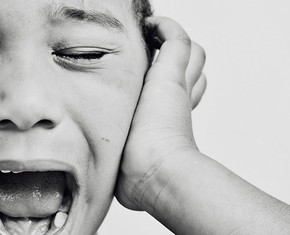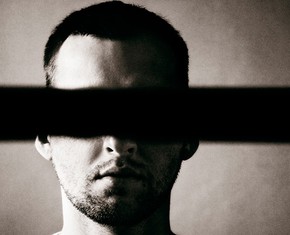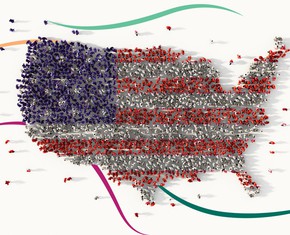The views expressed in our content reflect individual perspectives and do not represent the authoritative views of the Baha'i Faith.
Recently, I was watching a discussion about the current difficulties and crises that we are all experiencing. During this hour-long discussion, the phrase “returning to normal” was repeatedly mentioned as the ultimate goal that we all strive for and look forward to. I found myself thinking, why would I want things to go back to the way they were?
But why would I not want to go back to the way things were? Things for me were pretty good. As a Baha’i, I’m committed to the spiritual truth of the oneness of humanity, and I strive to act accordingly because the Baha’i writings tell us “let deeds, not words, be your adorning.” I recently learned that the ease of my life has had a lot to do with my “white privilege,” which has made all aspects of my life easier than others’. My life choices went unquestioned and unchallenged. Although this doesn’t mean that my life was free of hardship — I experienced war and a few bouts of serious illnesses and injuries, all of which I survived — I have lived a blessed life of privilege.
RELATED: 4 Practical Ways to Promote Race Unity
Despite this, my ardent hope is that we learn some lessons that will prevent us from ever considering going back to the pre-pandemic “normal.”
There are many issues that have become apparent to the wider society during the past few years; issues that we have been forced to face. Some, we must individually address and fix within ourselves; and others must change significantly on a collective level. As the 1967 classic song by Buffalo Springfield says, “There’s something happening here/What it is ain’t exactly clear/There’s a man with a gun over there/ telling me I got to beware. I think it’s time to stop/ children, what’s that sound/ everybody look, what’s going down?” Today, we are becoming acutely aware of what is “happening here” — to us, to our families, in our neighborhood, in our state, in our country, and in our world. We cannot allow the old “normal” to reemerge. The old normal doesn’t work.
During this past year, we have learned that approximately every one hundred years, humanity — or at least a large part of it — suffers through a pandemic. These health crises are always devastating, and we see the effects of COVID-19 in every area of our lives. Equally insidious is the looming environmental crisis. Humans are to blame for the impending, planet-encompassing perils of climate change, which we now witness in the form of unprecedented natural disasters.
The most spiritually devastating crisis of the last year, however, was that of racial injustice. The killing of George Floyd was witnessed worldwide, and sparked a global realization of how far we are from true racial equality. We witnessed not only the direct result of personal violence against our Black sisters and brothers, but also the outrageously disproportionate effects that all worldwide calamities have on all people of color, often going unnoticed by those who have privilege.
Richard Thomas, a Professor Emeritus of history at Michigan State University, wrote: “Neither the current racial crisis nor the current awakening is unique. Sadly, the United States has been here before. The American people have learned many lessons but have also forgotten other lessons about how best to solve the underlying problems facing their racially polarized society. For decades the country has seen countless efforts by brave and courageous individuals and dedicated organizations and institutions to hold back the relentless tide of racism. Many of these efforts have achieved great outcomes, but the tide has repeatedly rushed back in to test the resolve of every generation…”
Going forward, it is beyond comprehension that we would not be much better prepared, worldwide, for the inevitable next pandemic — and that we would not take steps to prevent both cataclysmic climate change and the continuation of relentless racial injustice. It is of utmost importance that we strive, far beyond our “normal” endeavors, to quickly solve this devastation and establish a new normal that will heal our world.
More than a century ago, Baha’u’llah, the prophet and founder of the Baha’i Faith, wrote: “The well-being of mankind, its peace and security, are unattainable unless and until its unity is firmly established.” The National Spiritual Assembly of the Baha’is of the United States, in the statement “The Vision of Race Unity: America’s Most Challenging Issue”, published in 1991, wrote that this “is a principle that issues naturally from the genesis and purpose of human existence.” The oneness of humanity is the pivot round which all the teachings of the Baha’i Faith revolve. It is at once a statement of principle and an assertion of the ultimate goal of human experience on the planet.
Because of this, the Baha’i community, both in the United States and around the world, is learning how best to build and sustain a multiracial community committed to racial justice and racial unity. It aspires to contribute to the broader struggle in society and to learn from the insights being generated by thoughtful individuals and groups working for a more just and united society.
RELATED: Organizing With My Community to Bring About Justice and Unity
Indeed, Thomas continued: “During some of America’s worst racial crises, the Baha’i community has joined the gallant struggle not only to hold back the tide of racism but also to build a multiracial community based on the recognition of the organic unity of the human race. Inspired by this spiritual and moral principle, the Baha’i community, though relatively small in number and resources, has, for well over a century, sought ways to contribute to the nation’s efforts to achieve racial justice and racial unity. This has been a work in progress, humbly shared with others. It is an ongoing endeavor, one the Baha’i community recognizes as ‘a long and thorny path beset with pitfalls.’”
Baha’is offer their communities the teachings of their Faith and longstanding commitment to the eradication of racial prejudice, convinced that these contribute toward an American society in which the “new normal” is characterized by justice and equity. We do so with firm faith in the assistance of the Creator, who, out of His infinite love, brought forth all humanity from the same stock that we might all belong to the same household.
In my community of Northern Colorado, Baha’is are actively engaged in the elimination of racial prejudice by actively serving in organizations such as the Northern Colorado Intertribal Powwow Association (NCIPA), The Ft. Collins Interfaith Council (FCIFC), the World Wisdom Project (WWP) and the Human Resource Commision (HRC). And on a neighborhood level, Baha’is around the world are actively engaged in educational activities to build loving, united, and prejudice-free communities.
Let us not strive backwards toward a past that provided comfort for a privileged few, but work together toward a future that will provide equity for all of humanity.
















Comments
Sign in or create an account
Continue with Googleor